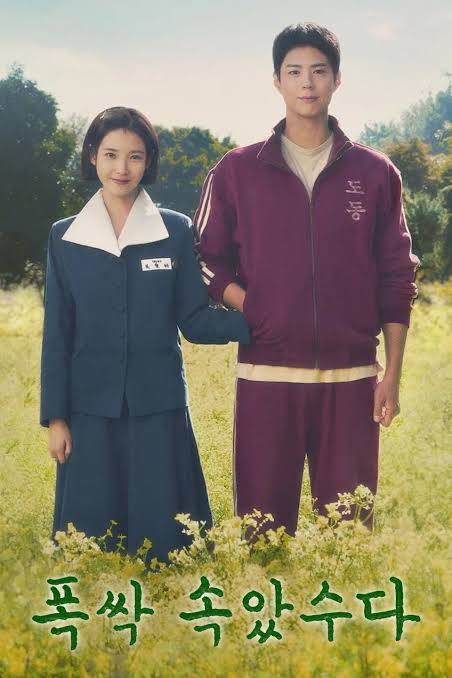
First broadcast: March 7, 2025 (South Korea)
Episodes: 16
Genre: Drama, Slice of Life, Romance
“Drama means: you tried your best.”
This sentence best encapsulates the gist of the Korean drama When Life Gives You Tangerines that was released on Netflix on March 7, 2025. Featuring IU, Park Bo-gum, Moon So-ri, and Park Hae-joon, the drama presents a heartfelt and emotionally gripping narrative based on solid writing and understated acting. It is more than just a tale of love and family, for this series is a portrait of women’s intergenerational struggles of resisting deeply embedded patriarchal structures in South Korea.
Unlike most Korean dramas, When Life Gives You Tangerines releases four episodes a week, each “volume” of which addresses a theme of loss, loss of a mother, child, lover, or ultimately, a spouse and father. But what truly distinguishes this drama is the manner in which it weaves feminist themes into the ordinary lives of its characters with honesty and subtlety.
Here’s why this drama is worth your attention from a feminist point of view:
1. Struggles of Women within a Patriarchal System
The first volume illustrates how Ae-sun’s mother, though under economic duress, becomes a sea diver in order to support her children. Gender discrimination is just as blatant in Ae-sun’s childhood, she is picked to be class vice president simply because she is a female, and later expelled from school for bad behavior compared to boys who are guilty of the same. Instead of being defeated, Ae-sun stands up to discrimination and then becomes an activist, claiming her rights in political and social contexts.
2. Gendered and Class-Based Discrimination
Yang Geum-myeong, as an adult man, is embarrassed by his girlfriend’s mother due to his lowly background. But the drama demonstrates his emotional integrity and dignity and introduces us to a woman who refuses to be determined by class or social status.
3. A Love Story Based on Equality
Ae-sun and Gwansik’s love life is a wholesome spin on relationships. Gwansik is not just a supportive partner, incidentally, he’s also a feminist ally. By insisting, “She’s not here to become your daughter-in-law,” he’s actively rejecting patriarchal domestic norms and safeguarding Ae-sun from the crushing expectations placed on women upon marriage.
4. Economic Empowerment for Women
Ae-sun’s grandmother invests her savings not in buying a house, but in buying a boat, a more economically productive item. This move underscores the importance of letting women exercise strategic financial decisions and defies the concept that a house is the ultimate sign of financial success.
5. Loss and the Will to Continue
The. death of a child is most likely the most devastating thing that can happen to any mother or father. But drama, again reminds us that life just keeps going, for those who need to go on. Ae-sun and Gwansik’s resilience in the midst of loss is demonstrated. not as emotional toughness, but stoic strength.
6. It’s Never Too Late for a Woman to Dream
The play highlights that women’s ambitions never grow old. Ae-sun writes a poetry book in her advanced age, proof that ambition and creativity are not the monopoly of youth, and that women can reclaim their dreams at any age.
7. Women Need Women
A poignant moment shows Ae-sun’s mother asking her mother-in-law to accompany her for a funeral photo shoot. This unstated request shows how even as mothers, women still look to maternal figures for emotional sustenance. Similarly, Geum-myeong, being in his thirties, still calls on his mother for help in taking care of his child, demonstrating the ongoing need for care and nurturing.
8. Parental Sacrifice as an Act of Love, Not Martyrdom
Ae-sun and Gwansik sell their house so that their daughter can study abroad. Rather than sentimentalizing sacrifice, the drama presents it as a deliberate act of love, something that recognizes the intergenerational cost of building a better future.
9. Parents Are Still Learning Too
The play depicts parenting as a lifelong process of discovery. There is one such agonizing moment when Ae-sun says, “Your father didn’t live for himself.” It’s a heart-wrenching reminder that parents always put themselves last, and that their emotional burdens are overdue recognition and pity.
When Life Gives You Tangerines is more than a family or romance drama, it’s a richly feminist tale of survival, resistance, and love that crosses generations. By highlighting everyday injustices and acts of strength, the show makes a strong case for gender justice, emotional truth, and rethinking what it means to be fully, authentically alive.
Some Quotes from this Drama
- “You can be ruined if you’re obsessed with status.” — Gwang Rye
- “When the time comes, all of this hardship will seem trivial, and I’ll be able to laugh about it.” — Gwang Rye
- “There will be tough days in your life. One day, life will feel so heavy that you’ll want to die. Don’t just lie there. Fight with all your might.” — Gwang Rye
- “I’d rather die earning money than die begging.” — Gwang Rye
- “I heard arrogance comes from emptiness. Maybe I shop so much because I grew up in poverty.” — Geum Myeong
- “It’s not life that’s evil, but money.” — Ae Sun’s Grandmother
- “Tell yourself that you won’t die and must survive no matter what. Swing your arms and legs with all your strength. You’ll come out of the dark sea and see the sky.” — Gwang Rye
- “The neighbors don’t know anything. Don’t listen to them.” — Oh Ae Sun
- “With 100 hwan a day, I just want to let my mother rest.” — Oh Ae Sun
- “I’m the one who’s poor, not you. Don’t stay still. Live your life to the fullest.” — Gwang Rye
- “All parents want their children to be loved more than anyone else.” — Gwang Rye
- “Today, my mother passed away, but I already missed her.” — Oh Ae Sun
- “In the end, all parents will die. Even if parents pass away first, the children must continue living. Life goes on.” — Gwang Rye
- “Parents think about what they couldn’t give, while children think about what they couldn’t get.” — Geum Myeong
- “I want to fly higher, but something holds me back. Guilt. The higher I want to fly, the greater my guilt becomes.” — Geum Myeong
- “I love her simply because she is my mother. There’s no other reason.” — Oh Ae Sun
- “Mother found her own happiness. There were bright moments in her life too. She had many beautiful times. I just want you to know that her life was also valuable.” — Oh Ae Sun
- “Talking to others is like writing a love letter. I carefully choose every word. When someone helps me even just once, they become my savior. But I treat the real savior—my parents, whom I owe everything to—like old paper. I’m not careful with my words or feelings with them.” — Geum Myeong
- “Dad always gave me more than he had. I wouldn’t trade him for the richest man.” — Geum Myeong
- “I can’t give you everything. But there’s one thing I will do for you, no matter what.” — Yang Gwan Sik
- “There’s no warm place in this world that would accept me. The only person who cares about me in this world is Yang Gwan Sik.” — Oh Ae Sun
- “There’s nothing in life you can take back. If your life and mine become one, then we’ll stay together—alive or dead.” — Oh Ae Sun
- “We may go through days of hunger, but you will never break my heart.” — Oh Ae Sun
- “Can love pay the bills? When people go hungry, they start to hate each other.” — Byeong Cheol
- “Do you know why I married Yang Gwan Sik? The most hopeless man in Jeju? Because he’s like steel.” — Oh Ae Sun
- “Mother, Grandma, Ae Sun came to live with me, not to be your daughter-in-law.” — Gwan Sik
